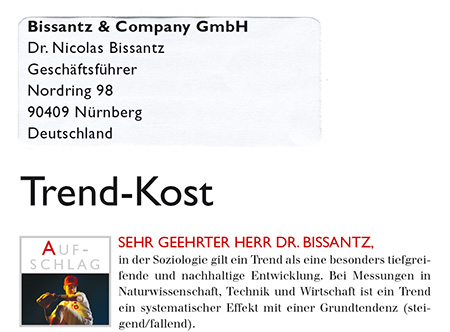We got mail – from “is report”, a German monthly journal about Business Intelligence. In each issue, the magazine’s editor in chief Eberhard Heins publishes an open letter to someone in the industry. This time, an article from our R&D blog caught his attention.
The journal prints the letter on one of the opening pages and the response in the back of the same issue. This is a rough translation of the letter that he sent to us for a coming issue:
Dear Dr. Bissantz,
A trend, from a sociological standpoint, is a very deep, sustainable development. For measurements in natural sciences, technology, business, and economics, a trend is defined as a systematic effect with a general tendency (i.e. increasing, decreasing).
Incorrectly assessing a market trend – which can result in sluggish sales or a business slump – is the nightmare of any decision-maker. The IT industry offers plenty of examples. Microsoft still dominates the market for desktop operating systems but is chasing behind Apple and Google in the market for mobile operating systems. Cloud pioneers for Customer Rela¬tionship Management (CRM) software such as Salesforce have made life harder for SAP, Oracle, and other giants in the business applications market. Many decision-makers in the publishing industry have also misjudged the effects of the Internet on their core business.

The open letter as published in is report 08/2014 (in German).
As stated on your homepage, Bissantz & Company is a software vendor that specializes in solutions for demanding data analysis tasks in business management. You have also presented (in German) an algorithm that recognizes a trend change in a times series as quickly and reliably as possible in order to improve the ongoing trend assessment. The algorithm works in an online version that corrects the assessment of the recent past gradually or makes the assumption of a trend change – if necessary, with each new incoming observation.
No technology can probably ever predict the future accurately. But do you think that this algorithm could have helped prevent or even reduce the severity of false assessments such as the ones described above if the decision-makers used Business Intelligence (BI) software based on it?
I look forward to your response!
Best regards,
Eberhard Heins
Editor in Chief, is report
We’ll show our response in the next posting.
